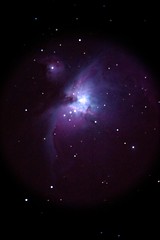OP is intersted in Landscape, which I know jsecord is much better at. He goes to dark sky locations too to do it. I'm kinda stuck in my backyard most of the time but use my 12inch telescope for deep sky stuff. Doing landscape shots do not work at my location with the nice brandnew street light giving me a 20% shadow at 2am.
On another note. Aperture makes a big difference.
FYI, I'll post them when I get a chance but I was fiddling around with my camera the other night. I took shots of a nebula
using the Tamron 150-600 @ f/5 @ 150mm
result ==> you could not see any colors, just dots.
using Nikon 50mm/1.4 @ 1.4
result ==> you could see a nice blue blob of the nebula, even though 1/3 the FOV of the tamron
using a telescope with a 12in aperture, 2,000mm
result => you can see multiple colors and a gigantic nebula
essentially, in deep space astrophotography you need to capture light. The larger the light gathering ability you have the better the outcome. Tracking helps too.
where as with the moon you just need the reach, the rest isn't as important to get the IQ as long as you shutter speed is fast enough, and the sky is clear. I use binoculars and check the ridges in - i think - it's the Sea of Tranquility upper right segment. If I can't see the ridges I know there's stuff in the way that you can't see which affects the IQ
here's one of my old nebulae shots with a 12 inch telescope essentially close to SOOC. None of my camera lenses can anything close to that to to light noise entering the picture fairly quickly.
 20140923-01 Orion Nebula
20140923-01 Orion Nebula by
Steve Sklar, on Flickr
)

 20140923-01 Orion Nebula
20140923-01 Orion Nebula







![[No title]](/data/xfmg/thumbnail/31/31035-96228fec87f6f8e8b5f3db4e93e99189.jpg?1734159134)
![[No title]](/data/xfmg/thumbnail/31/31034-2d8812b75c0bd23fdc2c885c24194e1f.jpg?1734159133)


